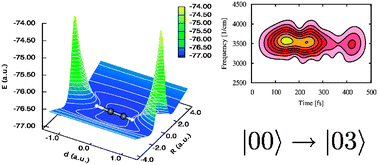Implementation of an iterative algorithm for optimal control of molecular dynamics into MCTDH
We have extended a previously implemented algorithm for using optimal control theory within the multi-configurational time-dependent Hartree (MCTDH) software. The new implementation allows the use of arbitrary dipole operators for generating the optimal laser field. A variant that does not require saving the time-dependent wave function has been developed, where simultaneous forward and backward propagations are performed. Input parameters are concentrated in a single input file analogous to the input files used elsewhere in MCTDH. We use here two simple examples to demonstrate the use of OCT-MCTDH: the modified Henon–Heiles potential and a two-dimensional model of acetylene. For both systems, a controlled transition between two vibrational states is tested. Results obtained with MCTDH and exact calculations are compared.

